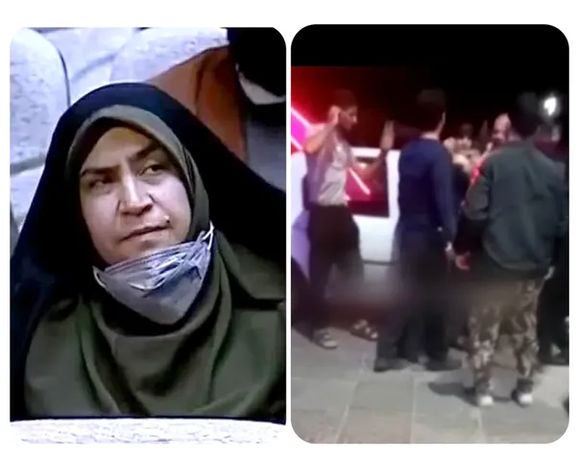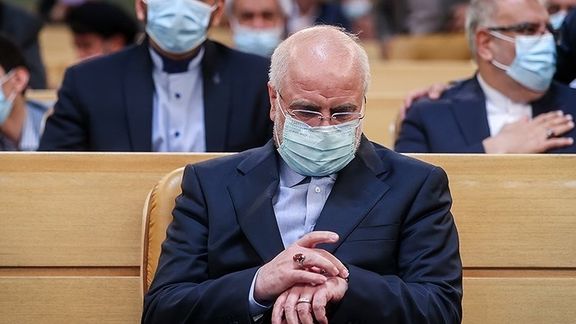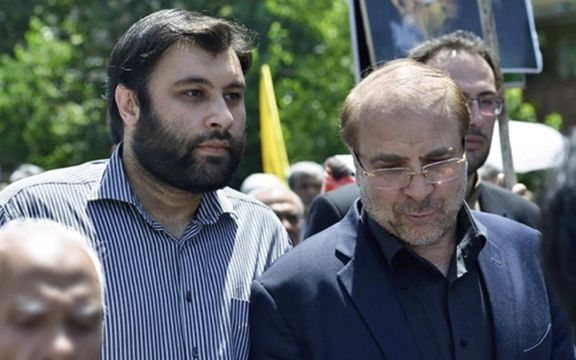Iran Lawmaker Defends Convicted Brother, Insists Loyal To Khamenei

A video posted to social media of Fatemeh Maghsoudi has made the Iranian parliamentarian the target of online fury.

A video posted to social media of Fatemeh Maghsoudi has made the Iranian parliamentarian the target of online fury.
The footage of Maghsoudi showed her apparently resisting the arrest of her brother, Hamid-Reza Maghsoudi, who was in her car at a gas station in Boroujerd, Lorestan province, on April 16.
The clip shows Fatemeh Maghsoudi, the city’s parliamentary representative, calling for help and attempting to free her brother from three police officers trying to take him into custody. Hamid-Reza Maghsoudi had been on the run since sentenced to five years in prison in January for selling a property he did not own.
Maghsoudi later claimed the officers had not introduced themselves, making her think he was the victim of an attempted kidnap. But some social media users were outraged and argued that she had not been complying with the law.
In an interview with the Iranian Labour News Agency published Wednesday, Maghsoudi, who is secretary of the women’s faction in parliament, took issue with Tasnim News for describing her as a reformist. She insisted she was a principlist and “completely a follower” of the Supreme Leader Ali Khamenei.

Kylie Moore-Gilbert, academic previously jailed in Iran for over two years, has recounted her harrowing ordeal in the Islamic Republic’s prisons.
In her latest book published earlier in April, titled ‘The Uncaged Sky: My 804 days in an Iranian prison’ the Australian-British expert on Islamic studies detailed her daily struggle to survive her incarceration.
Having spent time in two of the most notorious Iranian prisons -- Evin and Qarchak – she tells the readers how she was pushed to the limit of her endurance by extreme physical and psychological deprivation as she was held in a filthy solitary confinement cell for months, and subjected to relentless interrogation.
She narrated how she began adopting a strategy of resistance against her captors through multiple hunger strikes, letters smuggled to the media, and coordinated protests with other prisoners, as well as an escape attempt that led to her transfer to the isolated desert prison Qarchak.
She was arrested at Tehran Airport by Iran’s Revolutionary Guards on September 12, 2018, was convicted of espionage in a closed-door trial, and was sentenced to 10 years in prison.
Moore-Gilbert, who is a lecturer in Islamic Studies at Melbourne University, was released in November 2020 in a prisoner swap with three Iranian prisoners in Thailand, two of whom had been convicted in connection with a bombing plot in Bangkok in 2012.

Families of two German and two Austrian citizens currently jailed in Iran have called on the governments in Berlin and Vienna to demand their release as part of nuclear talks with Tehran.
In an open letter to German and Austrian foreign ministers published in Die Welt on Monday, the families of Nahid Taghavi, Jamshid Sharmahd, Kamran Ghaderi, and Masoud Mossaheb urged their respective governments to show they are committed to human rights.
The families questioned whether the two governments were doing enough to confront the Islamic Republic over its “hostage-taking” policy — targeting foreign citizens to use as bargaining chips to settle disputes with European governments.
“When, if not now, would it be time to publicly name our loved ones; to stand behind them, your citizens, and to demand their release with all vehemence?”, they asked Annalena Baerbock and Alexander Schallenberg.
Taghavi, 67, a German-Iranian rights activist is imprisoned since October 2020 and is sentenced to 10 years, while, Sharmahd, 66, is kept in isolation at a secret location since he was snatched by Iranian agents while travelling to India in August 2020. Sharmahd is accused of involvement in a 2008 mosque bombing in Iran that killed 14 people.
Mossaheb, 75, an engineer; and Ghaderi, 58, a businessman, are both held in Evin prison after each was sentenced to a decade in what rights groups say were unfair trials.

Iranian civil and human rights defender Narges Mohammadi who has returned to prison after an open-heart surgery is denied her medications, her lawyer says.
Mostafa Nili said on Tuesday that despite the delivery of the medicines to the Qarchak Prison, the authorities have refused to hand them over to Mohammadi, who was on furlough for the surgery until last week.
He said that Mohammadi has a coronary stent in one of her main arteries and must take her heart medication regularly.
Nili added that any delay in taking the medications can make the treatment process ineffective and even endanger her health.
Taghi Rahmani, her husband, had told Radio Farda that doctors believe she needed a longer period of recovery before she had to return to prison.
In a five-minute trial in late January, she was sentenced to eight years in jail and 70 lashes by Branch 26 of the Revolutionary Court, for trumped-up political chagres.
Mohammadi was arrested in November last year at the death anniversary of a victim shot by security forces during the November 2019 protests, reportedly while shopping.
She has been to jail several times over the past two decades. She was freed from Evin Prison in September 2020 after serving more than five years when she had no contact with her husband and children for long periods of time.
Persecution of human rights and political activists and executions have increased since hardliner president Ebrahim Raisi took office last August.

A trip by the family of Iran’s parliament speaker abroad to buy baby clothes and accessories has become his latest scandal, prompting calls for his resignation.
Mohammad Bagher Ghalibaf’s wife, daughter and son-in-law arrived at Tehran’s Imam Khomeini airport on Tuesday from Istanbul with apparently a large layette set they bought from Turkey. People at the airport didn’t recognize them at first but when a photo of the family circulated on social media, their identity was revealed, followed by a barrage of criticism, and resurfacing of other alleged corruption cases against the family.
Mohammad Bagher Ghalibaf became parliament speaker in 2020 after 'revolutionary principlists' or hardliners swept an engineered election, when most reformists were banned from running as candidates.
The harsh reaction to the incident is because of the hardship most Iranian face with 40-percent inflation and an eight-fold drop in the value of the national currency, impoverishing tens of millions of middle-class people.
Something that added to the controversy was a video of Ghalibaf in the 2017 presidential debates in which he censured a former minister for traveling to Italy to buy baby clothes. “You people think our economy will get better, never!” Ghalibaf is heard saying in the video.

The word for the layette in Persian is ‘sismuni’ a relic of Sanskrit that has survived in the language from Old Persian. Social media users have added the suffix for political scandals “gate” to it and are sharing the hashtag ‘SismuniGate’ in reference to the Watergate scandal.
In reaction to the latest chapter of Ghalibafs’ scandals, many activists and officials have called for the resignation of the parliament speaker. Reformist political commentator Abbas Abdi, however, says the news is so devastating that as a matter of principle he must resign from all his positions, but his replacement will definitely be worse than him. “So, I do not suggest resignation” he added.
The more important issue here is contradictory behavior by officials, he said, noting that “These paradoxes are not limited to this small case that has been exposed. It has destroyed almost all areas of Iran’s political and social life”.

Another civil activist, Vahid Ashtari, referring to government policies said it is not possible to preach to people to buy Iranian-made cars and other products, ban the import of home appliances, and send your family to Turkey to buy ‘sismuni’.
University professor and political activist Rahmatollah Bigdeli called for Ghalibaf’s to step aside, saying, "Only Ghalibaf's resignation will erase this stain”.
Ghalibaf's son Elias, criticized the trip by his sister, and said, “My sister and her husband did something that is absolutely wrong, especially in the current economic situation people face”. However, he added his father shouldn’t be judged by the actions of his sister, something also echoed by his media assistant, Mohammad Saeed Ahadian.
Ghalibaf is a household name in many corruption cases in the Islamic Republic. During his term as mayor of the capital Tehran, several of his deputies and people in his close circle were sentenced to 20 to 30 years in prison but the judiciary never prosecuted him, maybe because he is a close relative of Supreme Leader Ali Khamenei.
During the same period, Ghalibaf handed over lands with a total area of 71,397 square meters to his wife’s charity institute in 2011, apart from another 2.5 trillion rials, nearly $100 million at the time.
An audio file of Iran’s Revolutionary Guard commanders discussing massive financial corruption that leaked in February also directly involved Ghalibaf.
Some Iranian social media users say the country’s push to restrict the internet in Iran is aimed at preventing the exposure of such scandals by the Islamic Republic’s authorities and their families – especially their relatives who have been making the best use of their position since President Ebrahim Raisi took office.

A man with an Iranian name and an accomplice with Pakistani ties who were arrested in Washington DC for impersonating federal agents have been indicted by a federal grand jury.
Arian Taherzadeh and Haidar Ali were arrested earlier this month by the FBI when it came to light that they were impersonating Homeland Security agents and had established ties with Secret Service agents, lavishing gifts on them. One agent was a member of First Lady jill Biden’s protection detail.
They were indicted Tuesday on charges of false impersonation of a federal agent and possession of a large-capacity ammunition device. The suspects had a range of law enforcement paraphernalia in their possession when they were arrested, including body armor and surveillance equipment.
Their scheme required a considerable amount of money, and it is not clear how they financed their operation. They offered expensive rent-free apartments, guns, iPhones and other gifts to federal agents.
A judge on April 8 released them from detention on the grounds that prosecutors had not established a foreign connection, but Haidar Ali’s passport shows he had Iranian visas and might have traveled to Iran in recent years.
It is not clear if prosecutors will appeal the decision of the judge to release the suspects into the custody of their families after the grand jury indictment.